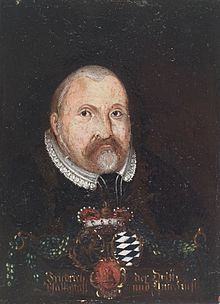Frederick III, Elector Palatine
| Frederick III, Elector Palatine | |
|---|---|

Frederick III, Elector Palatine
|
|
| Spouse(s) |
Marie of Brandenburg-Kulmbach Amalia of Neuenahr |
| Noble family | House of Wittelsbach |
| Father | John II of Simmern |
| Mother | Beatrice of Baden |
| Born |
14 February 1515 Simmern |
| Died | 26 October 1576 (aged 61) Heidelberg |
| Buried | Heiliggeistkirche, Heidelberg |
| Religion | Reformed |
Frederick III of Simmern, the Pious, Elector Palatine of the Rhine (February 14, 1515 – October 26, 1576) was a ruler from the house of Wittelsbach, branch Palatinate-Simmern-Sponheim. He was a son of John II of Simmern and inherited the Palatinate from the childless Elector Otto-Henry, Elector Palatine (Ottheinrich) in 1559. He was a devout convert to Calvinism, and made the Reformed confession the official religion of his domain by overseeing the composition and promulgation of the Heidelberg Catechism. His support of Calvinism gave the German Reformed movement a foothold within the Holy Roman Empire.
He was strictly educated in the Roman faith at his father's court and at Cologne, but, influenced by his wife, the pious princess Maria of Brandenburg, whom he married in 1537, he followed the Reformation, and in 1546 made a public profession of his faith. He succeeded his father John II as duke of Simmern, May 18, 1557, and became elector February 12, 1559, on the death of Otto Henry. Under his predecessor strict Lutherans like Tilemann Heshusius, Melanchthonians, and Calvinists had found a place in the Palatinate. In the summer of 1559 bitter controversies arose among them. Theses on the Lord's Supper prepared by the Heidelberg deacon Wilhelm Klebitz provoked a bitter controversy between him and Heshusius.
...
Wikipedia
